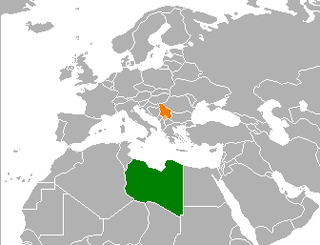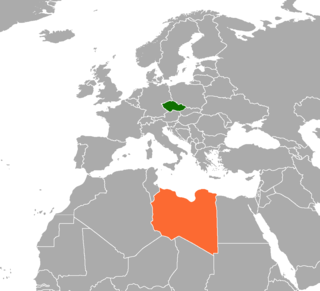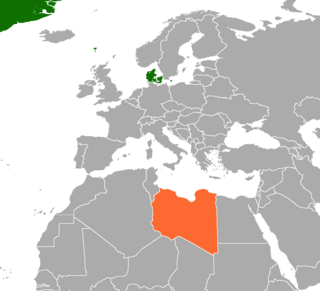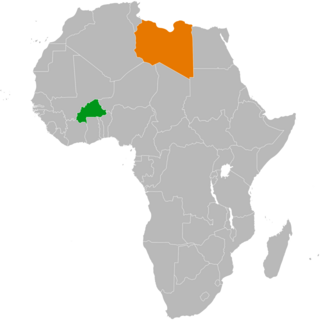
The foreign relations of Libya under Muammar Gaddafi (1969–2011) underwent much fluctuation and change. They were marked by severe tension with the West and by other national policies in the Middle East and Africa, including the Libyan government's financial and military support for numerous paramilitary and rebel groups.

The Libyan–Sudanese relations refers to the long historical relations between Libya and Sudan, both are Arab countries.

Libya–United States relations are the bilateral relations between the State of Libya and the United States of America. Relations are today cordial and cooperative, with particularly strong security cooperation only after the 2012 attack on the US liaison office or mission in Benghazi. Furthermore, a Gallup poll conducted in March and April 2012 found that Libyans had "among the highest approval" of US leadership in the entire Middle East and North Africa region.

Libya–Russia relations are the bilateral relations between the State of Libya and the Russian Federation. Russia has an embassy in Tripoli, with Libya having an embassy in Moscow. Diplomatic contact between Russia and Libya has generally been close and productive, seeing as both countries have had and continue to see volatile relations with the United States. Former Libyan leader Muammar al-Gaddafi was a close ally of the Soviet Union, despite his country's membership in the Non-Aligned Movement. Russia also regards Libya as one of its strongest allies in the Arab world, and has supported stabilization of the country following the aftermath of the Libyan Civil War. After the outbreak of new conflict, Russia has primarily backed the Tobruk-based House of Representatives over the UN-backed Government of National Accord and various other factions.

Franco-Libyan relations are the relations between Libya and France. For the most part, their historical relations are complicated. Libya maintains its embassy in Paris. France also has an embassy in Tripoli.

Diplomatic relations between Croatia and Libya were established on March 30, 2000. Croatia has an embassy in Tripoli. Libya has an embassy in Zagreb.

Libya–Serbia relations are diplomatic relations between Libya and Serbia. Libya has an embassy in Belgrade and Serbia has an embassy in Tripoli.

Czech Republic–Libya relations are foreign relations between Czech Republic and Libya. Both countries established diplomatic relations in 1993. The Czech Republic has an embassy in Tripoli. Libya has a consulate in Prague.

Belarus–Libya relations are foreign relations between Belarus and Libya. Both countries established diplomatic relations in 1992. Belarus has an embassy in Tripoli. Libya has an embassy in Minsk.

After the neighboring countries of Egypt and Libya both gained independence in the early 1950s, Egypt–Libya relations were initially cooperative. Libya assisted Egypt in the 1973 Arab-Israeli War. Later, tensions arose due to Egypt's rapprochement with the west. Following the 1977 Libyan–Egyptian War, relations were suspended for twelve years. However, since 1989 relations have steadily improved. With the progressive lifting of UN and US sanctions on Libya from 2003 to 2008, the two countries have been working together to jointly develop their oil and natural gas industries.

Switzerland has entertained formal relations with Libya's National Transitional Council (NTC) since 12 June 2011, dispatching an official envoy to Benghazi to "intensify its political relations with the Libyan National Transitional Council" and "signal its intent to strengthen its presence there".

Relations between Libya and the United Kingdom were initially close and positive after the British Armed Forces helped rebel forces to topple Muammar Gaddafi's regime in the 2011 Libyan Civil War. British officials have visited Libya several times since then, including two visits by Prime Minister David Cameron on which large crowds turned out to welcome him. The British Armed Forces are also helping to train Libya's National Army as part of wider cooperation on security matters. Security conditions have deteriorated since 2014, when the United Kingdom suspended operations from their embassy in Tripoli, into a second civil war. In June 2022, the United Kingdom re-opened its embassy in Tripoli.

Bab al-Azizia is a military barracks and compound situated in the southern suburbs of Tripoli, the capital of Libya. It served as the main base for the Libyan leader Muammar Gaddafi until its capture by anti-Gaddafi forces on 23 August 2011, during the Battle of Tripoli in the Libyan Civil War.
The international reactions to the Libyan Civil War were the responses to the series of protests and military confrontations occurring in Libya against the government of Libya and its de facto head of state Muammar Gaddafi.

Denmark–Libya relations refers to the current and historical relations between Denmark and Libya. Bilateral relations are tense because of the Jyllands-Posten Muhammad cartoons controversy and the 2011 military intervention in Libya. Denmark is represented in Libya, through its embassy in Cairo, Egypt. Danish Foreign Minister Villy Søvndal visited Libya in February 2012, for the opening of the new representative office in Tripoli.

The foreign relations of Libya were largely reset at the end of the Libyan Civil War, with the overthrow of Muammar Gaddafi and the Second Libyan Civil War. The current Minister of Foreign Affairs Since 15 March 2021 is Najla Mangoush Although many foreign embassies in Tripoli closed down in 2014 due to the fighting, by the end of 2017 thirty diplomatic missions were reopened in the Libyan capital.

India–Libya relations are bilateral diplomatic relations between India and Libya. India maintains an embassy in Tripoli and Libya has an embassy in New Delhi.

Burkina Faso–Libya relations refers to the current and historical relationship between Libya and Burkina Faso. Libya maintains an embassy in the Burkinabé capital of Ouagadougou, and Burkina Faso has an embassy in the Libyan capital of Tripoli.
The following lists events that happened during 2011 in Libya.

Iran and Libya have diplomatic relations, with embassies in each other's countries. Economic, military, and cultural relations between the two countries have varied throughout time. Ties between the two nations date back thousands of years, with the origins of the Persian Empire beginning in the modern day state of Iran and the modern day Libyan state once being an essential part of the Roman Empire.


























